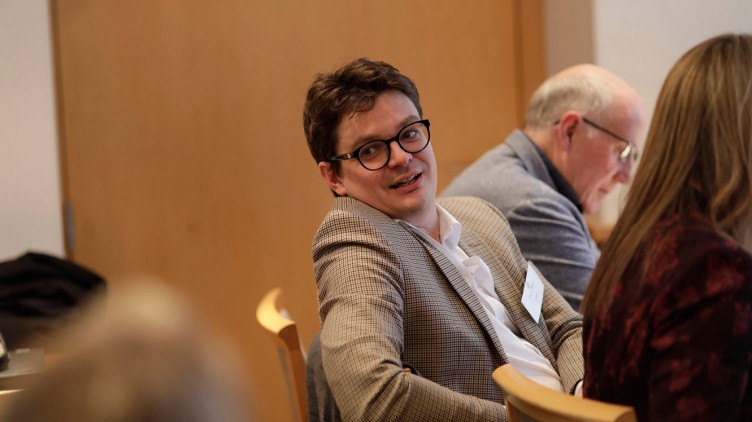Article
8th July 2025
Funding priorities for a 21st Century University
Universities are overflowing with ideas. On that, I don’t think anyone disagrees. The challenge isn’t one of ideation, but of stamina.

The heroic image of this stamina in action is a solo innovator, plugging away in some dimly-lit basement, sweating their way to a breakthrough. This is a far cry from what innovation looks like in reality. It is less an individual effort, more a rough and chaotic collaborative encounter. In short, it is not about a solitary F1 driver on a podium drenched in champagne, more a whole rugby team covered in blood, sweat and mud.
But what fuels this effort? We cannot apply the rugby player’s diet of high protein, low carbs and plenty of bitter. Instead, we need to talk about something far more shady.
Money.
The overflow of creativity at universities are all competing against each other to get funded. Obviously, there needs to be some triaging, but often universities develop their funding priorities, and the rest doesn’t get airtime, or gets the equivalent of a 5pm meeting on a Friday.
This is something I had to keep in mind when I got the window from the Other Place’s development office for social innovation: August.
August. Aka. Silly season. Aka. I’m out of office and won’t reply until September.
I didn’t expect social innovation to get the equivalent of a commercial at halftime in an England World Cup match, but it does suggest it really isn’t a priority for universities.
It puts the ‘third’ in Third Mission.
Let’s be clear: the role of university development offices is to raise money for the university itself. But surely raising money to invest in what a university produces isn’t just a ‘nice to have’, but absolutely mission-critical in achieving the goal of making money?
At Cambridge, we should raise the priority of funding the outputs of our great university. This way, our outputs become outcomes - both financial and societal. But even more crucially: doing so meets the demand.
Creating positive impact in a world that clearly needs it is what my generation is thinking about. But it’s not just fringe X/Millennials like me. It’s the rest of the millennial generation, it’s Gen Z behind them, and I’d wager Alphas will come in swinging demanding a world in which they have agency on too.
We live in a rapidly changing world. Those who will inherit what is coming will demand change, and they want a role in ensuring it is change that will benefit the world. We should be asking ourselves challenging questions about where we invest, what we back, and prioritising funding that allows us to fuel the fire of change.
To illustrate this, let’s talk about an area that’s changed yet we fund it like it’s still 2019: infrastructure.
I was at another great university last week, Warwick, visiting its magnificent new Faculty of Arts building. A net-zero building, fantastic engineering and a great space to work in. And it was pretty much empty.
Straight after lunch.
On a Monday.
When I worked at the BBC, Greg Dyke had made the decision to dig a big hole under New Broadcasting House and put News down there. The accommodation was such that people were expected to work from home for two days a week. Staff were very often frustrated as they no longer had their own office and workspace – a very vocal and expletive-laden frustration, often broadcast loudly around New Broadcasting House.
And then the pandemic.
No more problems.
Use of workspace has never returned to previous levels, despite militant attempts from business leaders to drag colleagues back in, kicking and screaming (a futile effort as the same cohort demanding change also despise the pre-2020 office status quo).
That is not to say we shouldn’t be investing in infrastructure – far from it. A lecture theatre for a 700 year old college that has never had one? Absolutely. New labs? The Cavendish was falling to bits when I was there 25 years ago, and the new Cavendish is magnificent and necessary. But could the same be said for new open plan offices?
Instead, our investments in infrastructure should go towards creating the economy of the future, not the past. Likewise, our investments more broadly should be forward-facing, creating the world we want to see, not reinforcing the worst of the one we’d like to leave behind.
That’s the role backing social innovation can play – turning our sciences, social sciences and humanities outputs into outcomes we want to see.
Will it be easy? Absolutely not. I wear the battle scars of failing to set up a social investment fund myself. But the demand is clear, as is the capital. While development directors are currently out there selling name plaques to anyone who can afford them (and I do encourage them to reach out if they want to rename their College bar ‘The Mannhole’), bursars are coming to me, saying: “alumni your age are saying that they don’t want to donate to College, but are interested in a social innovation”.
Given the right backing, if we give the idea a bit more sunlight, you can tap into a wealth of people who could invest in such a fund. From investors, to government, to alumni like me who are currently giving nothing in cash, we tell them this:
Cambridge is here to change the world for the better, and we want you to be a part of it.
The polls for the Chancellor race open tomorrow. If this is the role you want to see Cambridge play in the world, please consider lending me your support.


